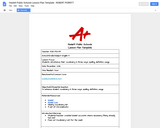
Students will enhance their vocabulary in three ways: spelling, definition, usage
- Subject:
- English Language Arts
- Material Type:
- Lesson
- Provider:
- Michigan Virtual
- Author:
- Rob Porritt
- Date Added:
- 04/28/2017

Students will enhance their vocabulary in three ways: spelling, definition, usage
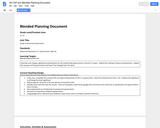
This lesson will be used on the second day of class to introduce the purpose for government. There is also a survey for the students to take about the top 10 achievements of the U.S. government in the last 75 years. There is also a powerpoint going over the first half of the key concepts in AP Government as well as a google forms quiz to give in the last 5 minutes of class.

Aboriginal Hand Print(art + history; art + social studies)"One old man in Arnhem Land remembered being carried as a child on his father's shoulders as his father climbed up a log leaning against a rock wall. His father then sprayed his hand with red ochre against the rock, leaving a stencil he could still recognize many years later. The main function of the stencils was to record people's presence and association with a site." — Aboriginal Art OnlineThe stenciled hand print and aboriginal style drawings help children to relate to the man from the Australian Aboriginal Culture stated above, while helping them to understand the use of line in art. A black paper with white splattered paint was used, but white paper with red (ochre) splattered paint would make a nice impression also. Construction paper crayons make bright, bold, linear designs around the hand stencil.Grade Levels K-4
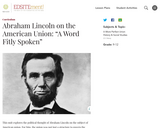
By examining Lincoln's three most famous speeches the Gettysburg Address and the First and Second Inaugural Addresses in addition to a little known fragment on the Constitution, union, and liberty, students trace what these documents say regarding the significance of union to the prospects for American self-government.
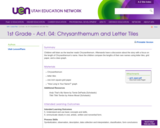
A word work activity to accompany the story Chrysanthemum.
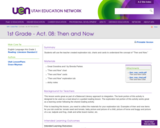
Students will use the teacher created exploration tub, charts and cards to understand the concept of "Then and Now."
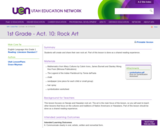
Students will create and share their own rock art. Part of this lesson is done as a shared reading experience.
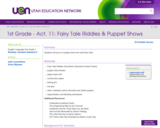
Students will put on a puppet show and retell fairy tales.
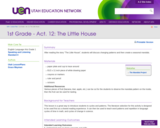
After reading the story "The Little House", students will discuss changing patterns and then create a seasonal mandala.
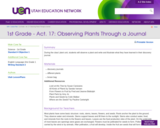
During the class' plant unit, students will observe a plant and write and illustrate what they have learned in their discovery journal.
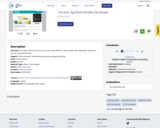
This video is part of the Learn and Grow with WHRO TV series. Watch Mrs. Diehl teach about the -ad and -ag word families.

The lesson is to be used to review the six addition strategies the first grade class has already learned. The strategies are: Add Zero Facts, Count On Facts, Make 10 Facts, Doubles Facts, Add 10 Facts, and Add 9 Facts. It also touches on the equal sign.

This lesson is designed to be used in a fitness facility. It is aligned with the Nebraska State Physical Education Standards.

Students will use iPads to research and perform a workout that focuses on core strength. Students will evaluate the workout upon completion.

This lesson is designed to be used in a fitness facility. It is aligned with the Nebraska State Physical Education Standards.
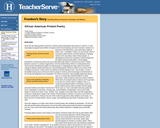
Given the secondary position of persons of African descent throughout their history in America, it could reasonably be argued that all efforts of creative writers from that group are forms of protest. However, for purposes of this discussion, Defining African American protest poetrysome parameters might be drawn. First—a definition. Protest, as used herein, refers to the practice within African American literature of bringing redress to the secondary status of black people, of attempting to achieve the acceptance of black people into the larger American body politic, of encouraging practitioners of democracy truly to live up to what democratic ideals on American soil mean. Protest literature consists of a variety of approaches, from the earliest literary efforts to contemporary times. These include articulating the plight of enslaved persons, challenging the larger white community to change its attitude toward those persons, and providing specific reference points for the nature of the complaints presented. In other words, the intention of protest literature was—and remains—to show inequalities among races and socio-economic groups in America and to encourage a transformation in the society that engenders such inequalities. For African Americans, Some of the questions motivating African American protest poetrythat inequality began with slavery. How, in a country that professed belief in an ideal democracy, could one group of persons enslave another? What forms of moral persuasion could be used to get them to see the error of their ways? In addition, how, in a country that professed belief in Christianity, could one group enslave persons whom Christian doctrine taught were their brothers and sisters? And the list of “hows” goes on. How could white Americans justify Jim Crow? Inequalities in education, housing, jobs, accommodation, transportation, and a host of other things? In response to these “hows,” another “how” emerged. How could writers use their imaginations and pens to bring about change in the society? Protest literature, therefore, focused on such issues and worked to rectify them. Poetry is but one of the media through which writers address such issues, as there are forms of protest fiction, drama, essays, and anything else that African Americans wrote—and write.
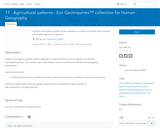
Students will explore global climatic datasets to analyze the factors that constrain and enable agricultural options.
GeoInquiries are designed to be fast and easy-to-use instructional resources that incorporate advanced web mapping technology. Each 15-minute activity in a collection is intended to be presented by the instructor from a single computer/projector classroom arrangement. No installation, fees, or logins are necessary to use these materials and software.

Exploring poetic and speaking & listening techniques and devices in the poem - 'Ain't I a woman?' by Sojourner Truth and Martin Luther King's 'I have a dream' speech. Worksheets and resources focusing on the lexical choices in the texts, and the effects of these.
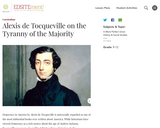
"Democracy in America" by Alexis de Tocqueville is one of the most influential books ever written about America. While historians have viewed "Democracy" as a rich source about the age of Andrew Jackson, Tocqueville was more of a political thinker than a historian. His "new political science" offers insights into the problematic issues faced by democratic society.
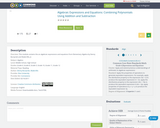
This module contains the an algebraic expressions and equations from Elementary Algebra by Denny Burzynski and Wade Ellis, Jr.